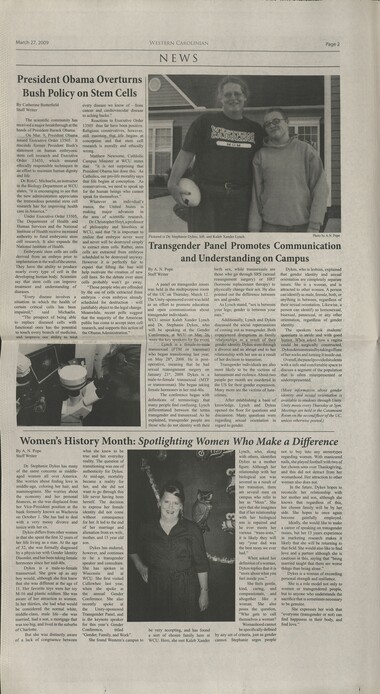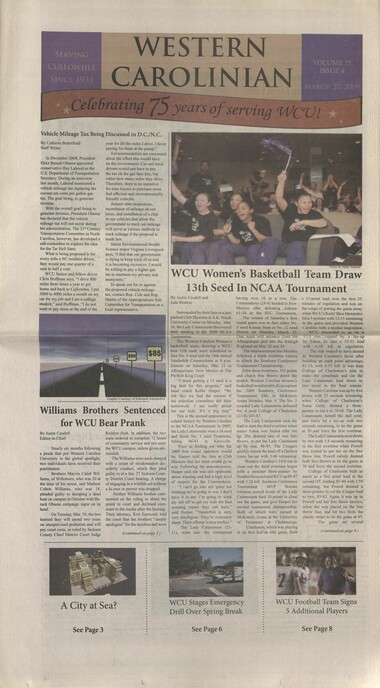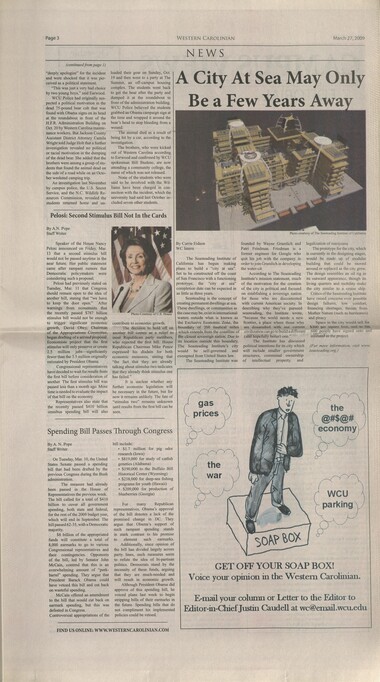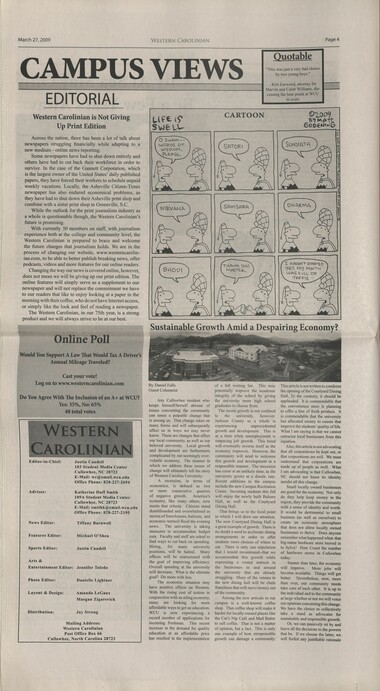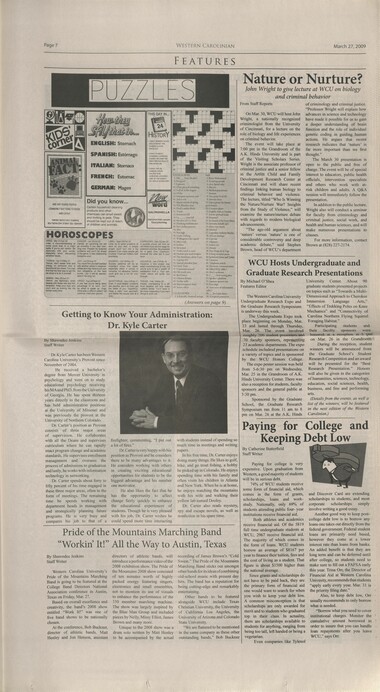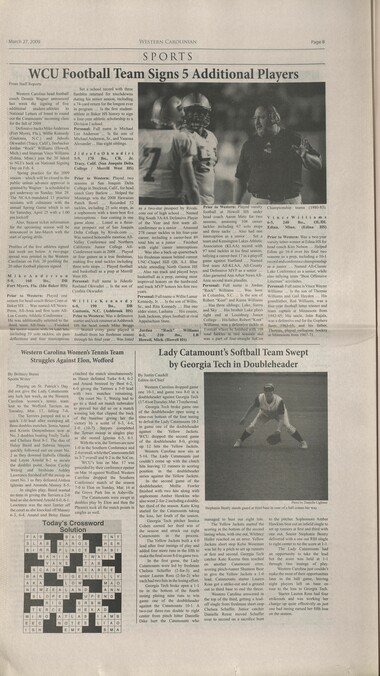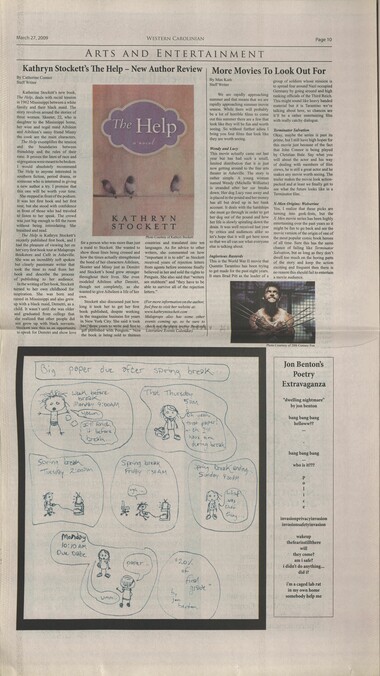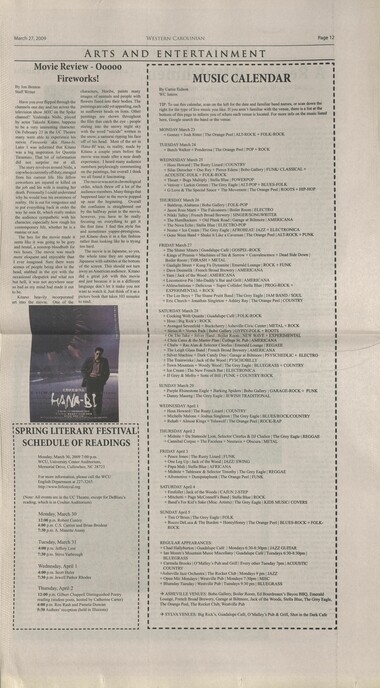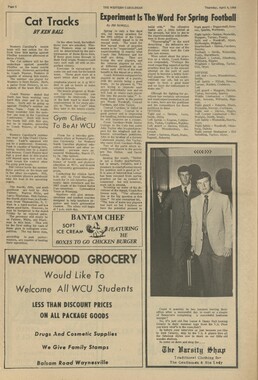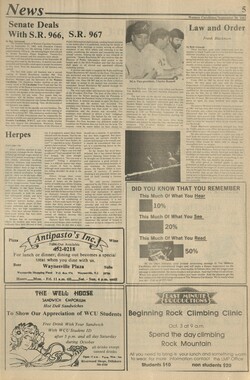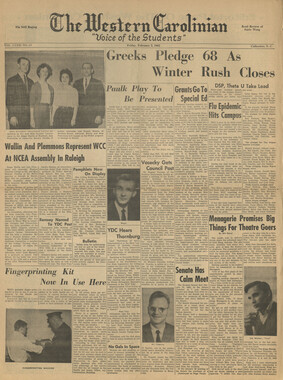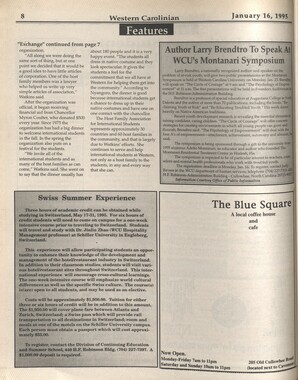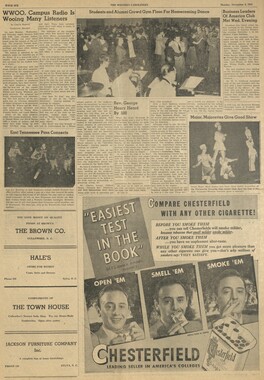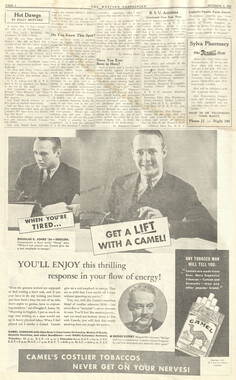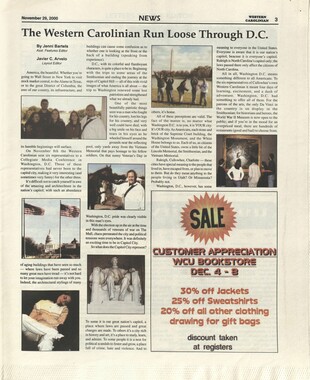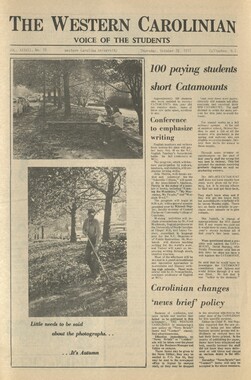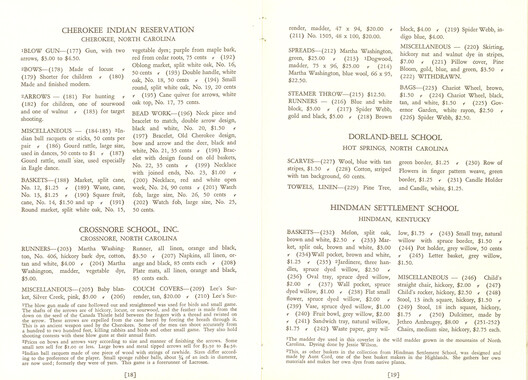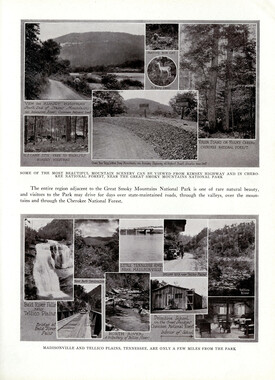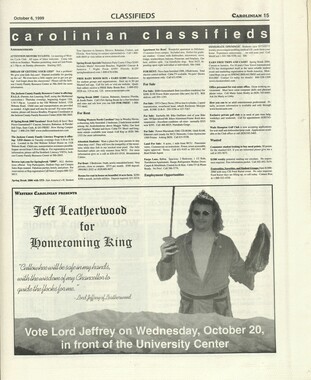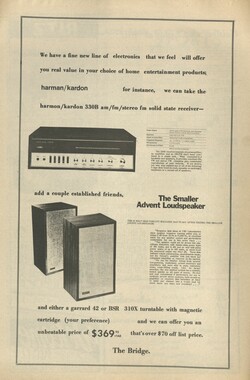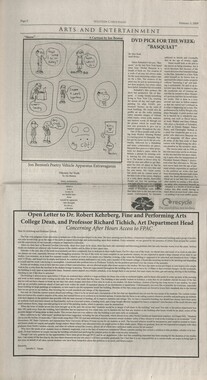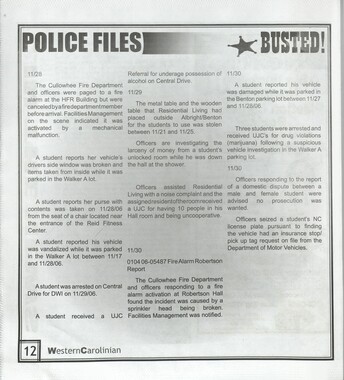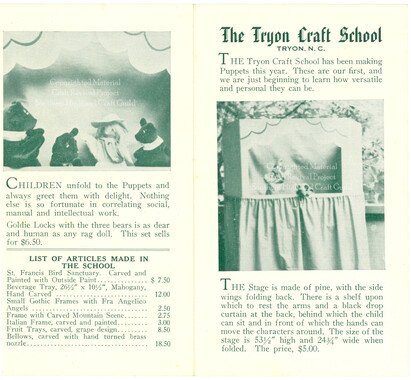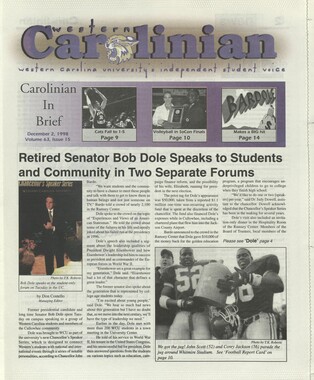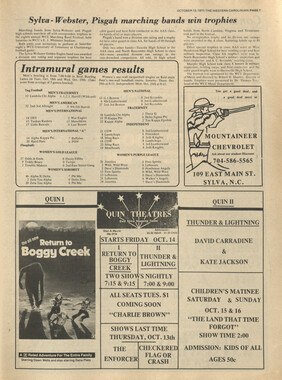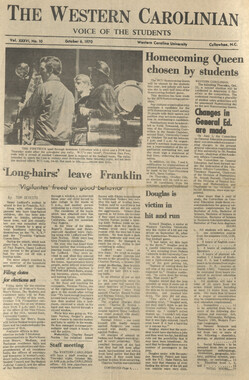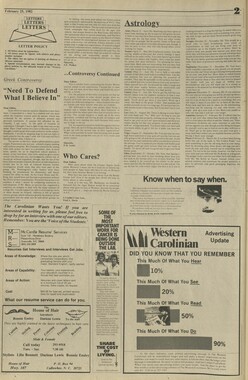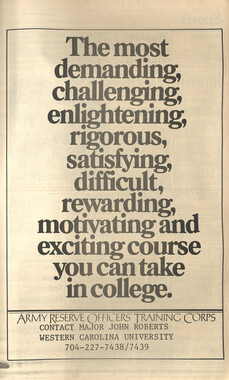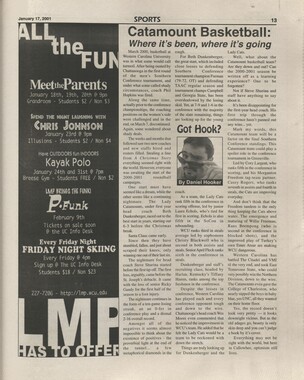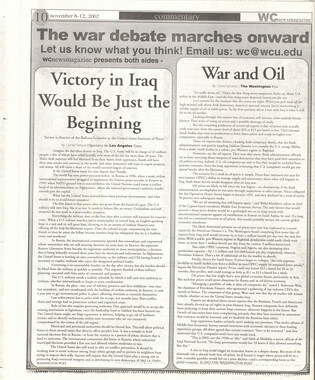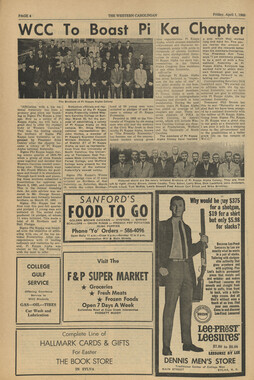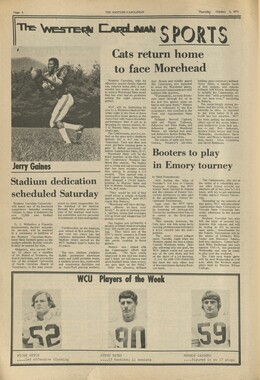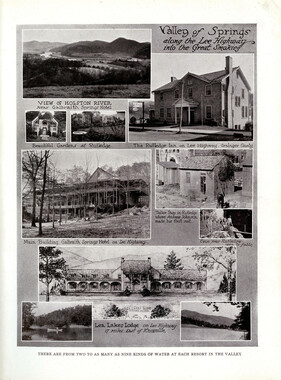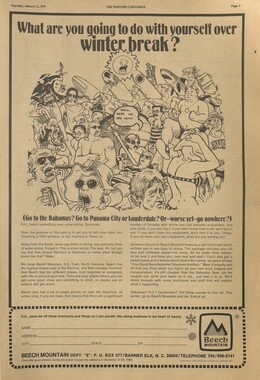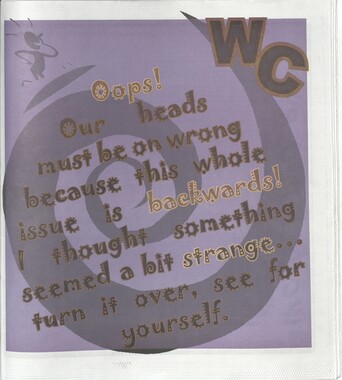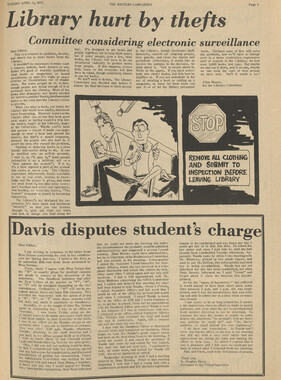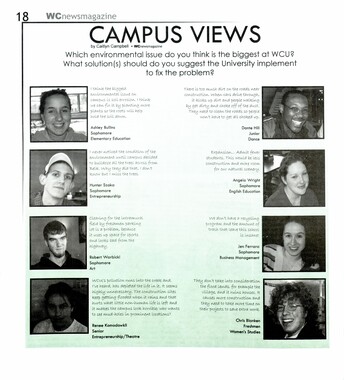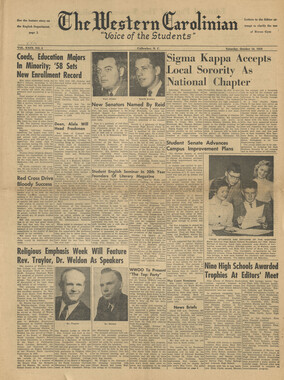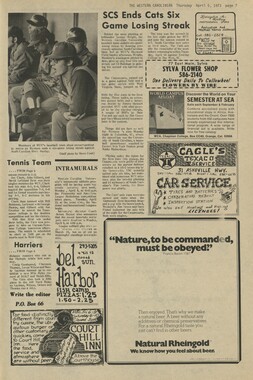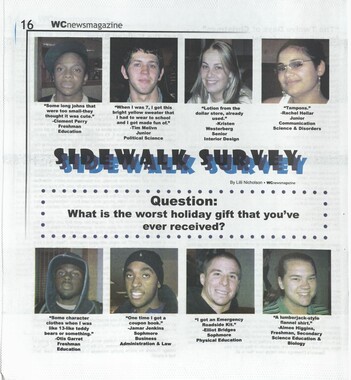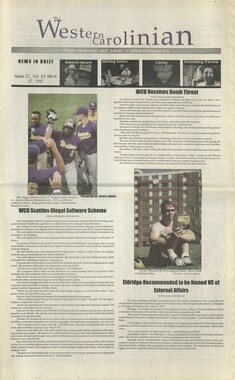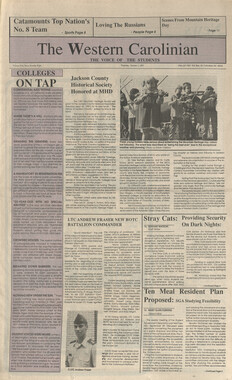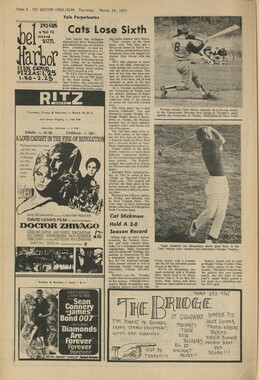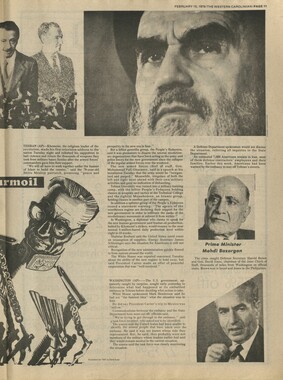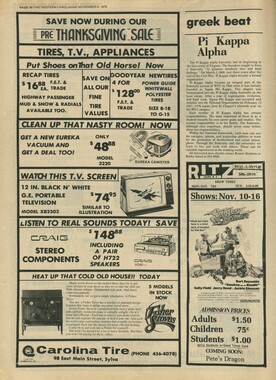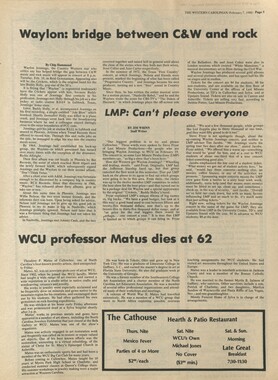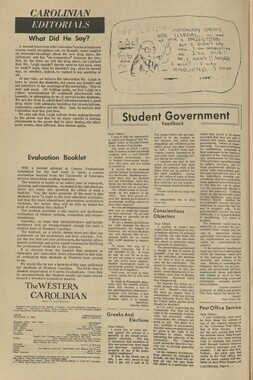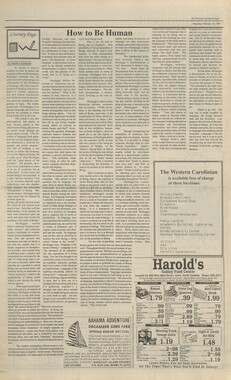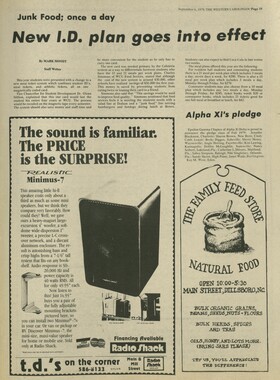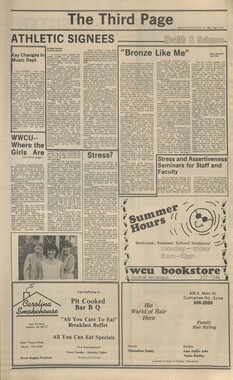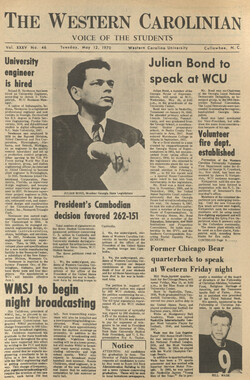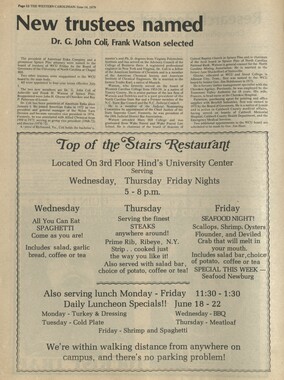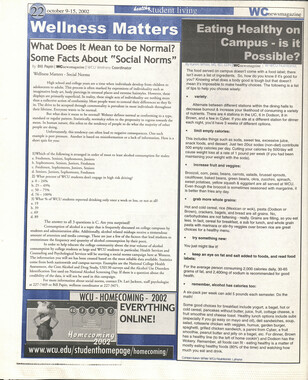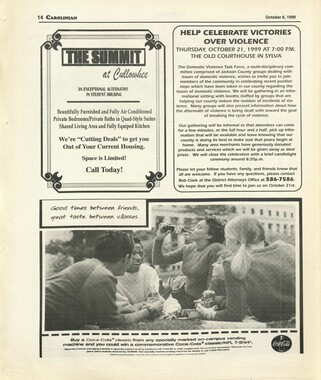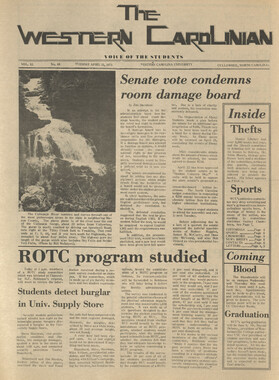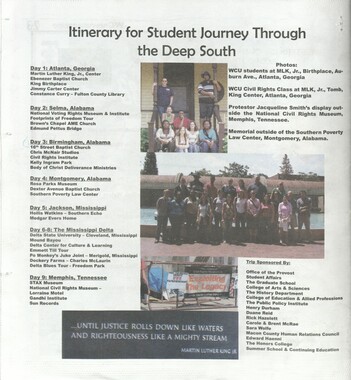Western Carolina University (20)
View all
- Canton Champion Fibre Company (2308)
- Cherokee Traditions (291)
- Civil War in Southern Appalachia (165)
- Craft Revival (1942)
- Great Smoky Mountains - A Park for America (2946)
- Highlights from Western Carolina University (430)
- Horace Kephart (941)
- Journeys Through Jackson (159)
- LGBTQIA+ Archive of Jackson County (85)
- Oral Histories of Western North Carolina (314)
- Picturing Appalachia (6873)
- Stories of Mountain Folk (413)
- Travel Western North Carolina (160)
- Western Carolina University Fine Art Museum Vitreograph Collection (129)
- Western Carolina University Herbarium (92)
- Western Carolina University: Making Memories (738)
- Western Carolina University Publications (2491)
- Western Carolina University Restricted Electronic Theses and Dissertations (146)
- Western North Carolina Regional Maps (71)
- World War II in Southern Appalachia (131)
University of North Carolina Asheville (6)
View all
- Western Carolina College (199)
- Western Carolina Teachers College (239)
- Western Carolina University (1976)
- Allanstand Cottage Industries (0)
- Appalachian National Park Association (0)
- Bennett, Kelly, 1890-1974 (0)
- Berry, Walter (0)
- Brasstown Carvers (0)
- Cain, Doreyl Ammons (0)
- Carver, George Washington, 1864?-1943 (0)
- Cathey, Joseph, 1803-1874 (0)
- Champion Fibre Company (0)
- Champion Paper and Fibre Company (0)
- Cherokee Indian Fair Association (0)
- Cherokee Language Program (0)
- Crittenden, Lorraine (0)
- Crowe, Amanda (0)
- Edmonston, Thomas Benton, 1842-1907 (0)
- Ensley, A. L. (Abraham Lincoln), 1865-1948 (0)
- Fromer, Irving Rhodes, 1913-1994 (0)
- George Butz (BFS 1907) (0)
- Goodrich, Frances Louisa (0)
- Grant, George Alexander, 1891-1964 (0)
- Heard, Marian Gladys (0)
- Kephart, Calvin, 1883-1969 (0)
- Kephart, Horace, 1862-1931 (0)
- Kephart, Laura, 1862-1954 (0)
- Laney, Gideon Thomas, 1889-1976 (0)
- Masa, George, 1881-1933 (0)
- McElhinney, William Julian, 1896-1953 (0)
- Niggli, Josephina, 1910-1983 (0)
- North Carolina Park Commission (0)
- Osborne, Kezia Stradley (0)
- Owens, Samuel Robert, 1918-1995 (0)
- Penland Weavers and Potters (0)
- Rhodes, Judy (0)
- Roberts, Vivienne (0)
- Roth, Albert, 1890-1974 (0)
- Schenck, Carl Alwin, 1868-1955 (0)
- Sherrill's Photography Studio (0)
- Smith, Edward Clark (0)
- Southern Highland Handicraft Guild (0)
- Southern Highlanders, Inc. (0)
- Stalcup, Jesse Bryson (0)
- Stearns, I. K. (0)
- Thompson, James Edward, 1880-1976 (0)
- United States. Indian Arts and Crafts Board (0)
- USFS (0)
- Vance, Zebulon Baird, 1830-1894 (0)
- Weaver, Zebulon, 1872-1948 (0)
- Western Carolina University. Mountain Heritage Center (0)
- Whitman, Walt, 1819-1892 (0)
- Wilburn, Hiram Coleman, 1880-1967 (0)
- Williams, Isadora (0)
- 1920s (57)
- 1930s (69)
- 1940s (114)
- 1950s (66)
- 1960s (314)
- 1970s (599)
- 1980s (406)
- 1990s (379)
- 2000s (282)
- 2010s (178)
- 1600s (0)
- 1700s (0)
- 1800s (0)
- 1810s (0)
- 1820s (0)
- 1830s (0)
- 1840s (0)
- 1850s (0)
- 1860s (0)
- 1870s (0)
- 1880s (0)
- 1890s (0)
- 1900s (0)
- 1910s (0)
- 2020s (0)
- Jackson County (N.C.) (2466)
- Appalachian Region, Southern (0)
- Asheville (N.C.) (0)
- Avery County (N.C.) (0)
- Blount County (Tenn.) (0)
- Buncombe County (N.C.) (0)
- Cherokee County (N.C.) (0)
- Clay County (N.C.) (0)
- Graham County (N.C.) (0)
- Great Smoky Mountains National Park (N.C. and Tenn.) (0)
- Haywood County (N.C.) (0)
- Henderson County (N.C.) (0)
- Knox County (Tenn.) (0)
- Knoxville (Tenn.) (0)
- Lake Santeetlah (N.C.) (0)
- Macon County (N.C.) (0)
- Madison County (N.C.) (0)
- McDowell County (N.C.) (0)
- Mitchell County (N.C.) (0)
- Polk County (N.C.) (0)
- Qualla Boundary (0)
- Rutherford County (N.C.) (0)
- Swain County (N.C.) (0)
- Transylvania County (N.C.) (0)
- Watauga County (N.C.) (0)
- Waynesville (N.C.) (0)
- Yancey County (N.C.) (0)
- Newsletters (510)
- Publications (documents) (1981)
- Aerial Photographs (0)
- Aerial Views (0)
- Albums (books) (0)
- Articles (0)
- Artifacts (object Genre) (0)
- Bibliographies (0)
- Biography (general Genre) (0)
- Cards (information Artifacts) (0)
- Clippings (information Artifacts) (0)
- Copybooks (instructional Materials) (0)
- Crafts (art Genres) (0)
- Depictions (visual Works) (0)
- Design Drawings (0)
- Drawings (visual Works) (0)
- Envelopes (0)
- Exhibitions (events) (0)
- Facsimiles (reproductions) (0)
- Fiction (general Genre) (0)
- Financial Records (0)
- Fliers (printed Matter) (0)
- Glass Plate Negatives (0)
- Guidebooks (0)
- Internegatives (0)
- Interviews (0)
- Land Surveys (0)
- Letters (correspondence) (0)
- Manuscripts (documents) (0)
- Maps (documents) (0)
- Memorandums (0)
- Minutes (administrative Records) (0)
- Negatives (photographs) (0)
- Newspapers (0)
- Notebooks (0)
- Occupation Currency (0)
- Paintings (visual Works) (0)
- Pen And Ink Drawings (0)
- Periodicals (0)
- Personal Narratives (0)
- Photographs (0)
- Plans (maps) (0)
- Poetry (0)
- Portraits (0)
- Postcards (0)
- Programs (documents) (0)
- Questionnaires (0)
- Relief Prints (0)
- Sayings (literary Genre) (0)
- Scrapbooks (0)
- Sheet Music (0)
- Slides (photographs) (0)
- Songs (musical Compositions) (0)
- Sound Recordings (0)
- Specimens (0)
- Speeches (documents) (0)
- Text Messages (0)
- Tintypes (photographs) (0)
- Transcripts (0)
- Video Recordings (physical Artifacts) (0)
- The Reporter, Western Carolina University (510)
- WCU Students Newspapers Collection (1923)
- A.L. Ensley Collection (0)
- Appalachian Industrial School Records (0)
- Appalachian National Park Association Records (0)
- Axley-Meroney Collection (0)
- Bayard Wootten Photograph Collection (0)
- Bethel Rural Community Organization Collection (0)
- Blumer Collection (0)
- C.W. Slagle Collection (0)
- Canton Area Historical Museum (0)
- Carlos C. Campbell Collection (0)
- Cataloochee History Project (0)
- Cherokee Studies Collection (0)
- Daisy Dame Photograph Album (0)
- Daniel Boone VI Collection (0)
- Doris Ulmann Photograph Collection (0)
- Elizabeth H. Lasley Collection (0)
- Elizabeth Woolworth Szold Fleharty Collection (0)
- Frank Fry Collection (0)
- George Masa Collection (0)
- Gideon Laney Collection (0)
- Hazel Scarborough Collection (0)
- Hiram C. Wilburn Papers (0)
- Historic Photographs Collection (0)
- Horace Kephart Collection (0)
- Humbard Collection (0)
- Hunter and Weaver Families Collection (0)
- I. D. Blumenthal Collection (0)
- Isadora Williams Collection (0)
- Jesse Bryson Stalcup Collection (0)
- Jim Thompson Collection (0)
- John B. Battle Collection (0)
- John C. Campbell Folk School Records (0)
- John Parris Collection (0)
- Judaculla Rock project (0)
- Kelly Bennett Collection (0)
- Love Family Papers (0)
- Major Wiley Parris Civil War Letters (0)
- Map Collection (0)
- McFee-Misemer Civil War Letters (0)
- Mountain Heritage Center Collection (0)
- Norburn - Robertson - Thomson Families Collection (0)
- Pauline Hood Collection (0)
- Pre-Guild Collection (0)
- Qualla Arts and Crafts Mutual Collection (0)
- R.A. Romanes Collection (0)
- Rosser H. Taylor Collection (0)
- Samuel Robert Owens Collection (0)
- Sara Madison Collection (0)
- Sherrill Studio Photo Collection (0)
- Smoky Mountains Hiking Club Collection (0)
- Stories of Mountain Folk - Radio Programs (0)
- Venoy and Elizabeth Reed Collection (0)
- WCU Gender and Sexuality Oral History Project (0)
- WCU Mountain Heritage Center Oral Histories (0)
- WCU Oral History Collection - Mountain People, Mountain Lives (0)
- Western North Carolina Tomorrow Black Oral History Project (0)
- William Williams Stringfield Collection (0)
- Zebulon Weaver Collection (0)
- College student newspapers and periodicals (1951)
- African Americans (0)
- Appalachian Trail (0)
- Artisans (0)
- Cherokee art (0)
- Cherokee artists -- North Carolina (0)
- Cherokee language (0)
- Cherokee pottery (0)
- Cherokee women (0)
- Church buildings (0)
- Civilian Conservation Corps (U.S.) (0)
- Dams (0)
- Dance (0)
- Education (0)
- Floods (0)
- Folk music (0)
- Forced removal, 1813-1903 (0)
- Forest conservation (0)
- Forests and forestry (0)
- Gender nonconformity (0)
- Great Smoky Mountains National Park (N.C. and Tenn.) (0)
- Hunting (0)
- Landscape photography (0)
- Logging (0)
- Maps (0)
- Mines and mineral resources (0)
- North Carolina -- Maps (0)
- Paper industry (0)
- Postcards (0)
- Pottery (0)
- Railroad trains (0)
- Rural electrification -- North Carolina, Western (0)
- School integration -- Southern States (0)
- Segregation -- North Carolina, Western (0)
- Slavery (0)
- Sports (0)
- Storytelling (0)
- Waterfalls -- Great Smoky Mountains (N.C. and Tenn.) (0)
- Weaving -- Appalachian Region, Southern (0)
- Wood-carving -- Appalachian Region, Southern (0)
- World War, 1939-1945 (0)
- Text (2491)
- MovingImage (0)
- Sound (0)
- StillImage (0)
Western Carolinian Volume 75 Number 04
Item
Item’s are ‘child’ level descriptions to ‘parent’ objects, (e.g. one page of a whole book).
-
-
March 27, 2009 WESTERN CAROLINIAN Page 2 NEWS President Obama Overturns Bush Policy on Stem Cells By Catherine Butterfield Staff Writer The scientific community has received a major breakthrough at the hands of President Barack Obama. _ On Mar, 9, President Obama issued Executive Order 13505. It rescinds former President Bushs statement on human embryonic stem cell research and Executive Order 13435, which ensured ethically responsible techniques in an effort to maintain human dignity and life Dr. RonC., Michaelis, an instructor in the Biology Department at WCU states, it is encouraging to see that the new administration appreciates the tremendous potential stem cell research has for improving health care in America. Under Executive Order 13505, The Department of Health and Human Services and the National Institute of Health receive increased _ authority to fund embryonic stem cell research. It also expands the National Institute of Health. Embryonic stem cells are cells derived from an embryo prior to implantation in the wall of the uterus. They have the ability to produce nearly every type of cell in the developing human body. Scientists say that stem cells can improve treatment and understanding of diseases. Every disease involves a situation in which: the health of certain critical cells has been impaired, said Michaelis. The prospect of being able to replace diseased cells with functional ones has the potential to touch every branch of medicine, and improve our ability to treat every disease we know of - from cancer and cardiovascular disease to aching backs. Reactions to Executive Order 13505 thus far have been positive. Religious conservatives, however, still maintain, that,.life begins at conception and that stem cell research is morally and ethically wrong. Matthew Newsome, Cathlolic Campus Minister at WCU states that it is not surprising that President Obama has done this. As Catholics, our pro-life morality says that life begins at conception. As conservatives, we need to speak up for the human beings who cannot speak for themselves. Whatever an _ individuals stance, the United States is making major advances in the area of scientific research. Dr. Christopher Hoyt, a professor of philosophy and bioethics at WCU, said that it is important to realize that embryos never were and never will be destroyed simply to extract stem cells. Rather, stem cells are extracted from embryos scheduled to be destroyed anyway. However it is perfectly fair to expect that lifting the ban will help motivate the creation of new cell lines. So the debate over stem cells probably wont go away. Those people who are offended by the use of cells extracted from embryos - even embryos already scheduled for destruction - will justifiably object to the legal change. Meanwhile, recent polls suggest that the majority of the American public has come to accept stem cell research, and supports this action of the Obama Administration. VELSRROD oteiieee Un oats Pictured is Dr. Stephanie Dykes, left, and Kaleb Xander Lynch. Transgender Panel Promotes Communication and Understanding on Campus By A. N. Pope Staff Writer A panel on transgender issues was held in the multipurpose room of the UC on Thursday, March 12. The Unity-sponsored event was held as an effort to promote education and open communication about transgender individuals. WCU senior Kaleb Xander Lynch and Dr. Stephanie Dykes, who will be speaking at the Gender Conference, at WCUon Mar. 20, | were the key speakers for the event. Lynch isa female-to-male He Be (FIM or transman) who began transitioning last year, on May 28", 2008. He is post- operative, meaning that he had sexual reassignment surgery on January 21%, 2009. Dykes is a male-to-female transsexual (MTF or transwoman). She began taking female hormones in her mid-40s. The conference began with definitions of terminology that many people find confusing. Lynch differentiated between the terms transgender and transsexual. As he explained, transgender people are those who do not identity with their birth sex, while transsexuals are those who go through SRS (sexual reassignment surgery) or HRT (hormone replacement therapy) to physically change their sex. He also pointed out the difference between sex and gender. As Lynch stated, sex is between your legs; gender is between your ears. Additionally, Lynch and Dykes discussed the social repercussions of coming out as transgender. Both experienced disruptions in family relationships as a result, of , their gender identity. Dykes went through a divorce and an abrupt end to her relationship with her son as a result of her decision to transition. Transgender individuals are also more likely to be the victims of harassment and violence, About two people per month are murdered in the US for their gender expression. Many more are the victims of hate- crimes. After establishing a base of knowledge, Lynch and Dykes opened the floor for questions and discussion. Many questions were regarding sexual orientation in regard to gender. Photo by A.N. Pope Dykes, who is lesbian, explained that gender identity and sexual orientation are completely separate issues. She is a woman, and is attracted to other women. A person can identify as male, female, both, or anything in between, regardless of their sexual orientation. Likewise, a person can identify as homosexual, bisexual, pansexual, or any other orientation, regardless of gender identity. The speakers took students questions iny-stride and with good humor,, When asked how a yagina could ,.be . surgically constructed, Dykesdemonstratedbytakingoffone of her socks and turning it inside out. Overall, thepanelprovidedstudents with a safe and comfortable space to discuss a segment of the population that is often misrepresented or underrepresented. (More information about gender identity and sexual orientation is available to students through Unity. Unity meets every Thursday at 5pm. Meetings are held in the Catamount Room on the second floor of the UC, unless otherwise posted.) Womens History Month: Spotlighting Women Who Make a Difference By A. N. Pope Staff Writer Dr. Stephanie Dykes has many of the same concerns as middle- aged women all over America. She worries about finding love in middle-age, coloring her hair, and mammograms. She worries about the economy and her personal finances, as she was displaced from her Vice-President position at the bank formerly known as Wachovia on October 1. She has had to deal with a very messy divorce and issues with her ex. Dykes differs from other women in that she spent the first 32 years of her life living as a man. At the age of 32, she was formally diagnosed by a physician with Gender Identity Disorder, and has been taking female hormones since her mid-40s. Dykes is a _ male-to-female transsexual. She grew up as any boy would, although she first knew that she was different at the age of 11. Her favorite toys were her toy M-16 and plastic soldiers. She was aware of her attraction to women. In her thirties, she had what would be considered the normal white, middle-class, male lifeshe was married, had a son, a mortgage that was too big, and lived in the suburbs of Charlotte. But she was distinctly aware of a lack of congruence between what she knew to be true and her everyday reality. The question of transitioning was one of authenticity for Dykes. At mid-age, mortality became a reality for her, and she did not want to go through this life never having been herself. The decision to express her female identity did not come without consequence for her. It led to the end of her marriage and alienation from ex-wife, mother, and 15 year old son. Dykes has endured, however, and continues to be a transgender speaker and consultant. She has spoken in Wisconsin and at WCU. She first visited Cullowhee last year, when she spoke at the annual Gender Conference. She also recently spoke at the | Unity-sponsored Transgender Panel, and is the keynote speaker for this years Gender Conference, titled Gender, Family, and Work. She found Westerns campus to be very accepting, and has found a sort of chosen family here at WCU. Here, she met Kaleb Xander Lynch, who, along with others, identifies Dykes as a mother figure. Although her relationship with her biological son was severed as a result of her transition, there are several men on campus who refer to her as Mom. She says that she imagines that if her relationship with her biological son is repaired and he ever meets her various trans-sons, it is likely they will say your dad was the best mom we ever had. When asked her definition of a woman, Dykes replies that it is more about what you feel inside you. She feels gentle, kind, caring, and compassionate, and altogether like a woman. She _ also poses the question, Who gets to call themselves a woman? Womanhood cannot be specifically defined by any set of criteria, just as gender cannot. Stephanie urges people not to buy into any stereotypes regarding women. With manicured nails, she played football with two of her chosen sons over Thanksgiving, and this did not detract from her womanhood. Her attraction to other women also does not. In the future, Dykes hopes to reconcile her relationship with her mother and son, although she knows that regardless of this, her chosen family will be by her side. She hopes to once again become gainfully | employed. Ideally, she would like to make a career of speaking on transgender issues, but her 13 years experience in marketing research makes it likely that she will be returning to that field. She would also like to find love and a partner although she is cautious in this, saying that being married taught that there are worse things than being alone. Dykes is a woman of exceeding personal strength and resilience. She is a role model not only to women or transgendered people, but to anyone who understands the sacrifice that is sometimes necessary to be genuine. She expresses her wish that everyone (transgender or not) can find happiness in their body, and find love.
Object
Object’s are ‘parent’ level descriptions to ‘children’ items, (e.g. a book with pages).
-
The Western Carolinian is Western Carolina University's student-run newspaper. The paper was published as the Cullowhee Yodel from 1924 to 1931 before changing its name to The Western Carolinian in 1933.
-
